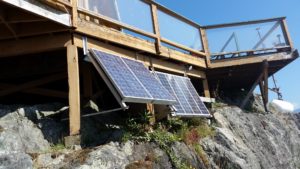Abstract: Passage Island Home Inspector notes on totally self-sufficient residence with respect to not being connected to any municipal power, gas, water or sewage systems. However, it now becomes the owner’s responsiblity to install and maintain such services.
Have you ever wanted to buy an ‘off the grid’, cliff-side waterfront property, with spectacular views, live in it year-round and commute daily to the office? Well that’s exactly what a recent client intended to do with a Passage Island property.
In this particular case the property has the following self-contained features:
- power is from solar cells,
- water is from rainwater catchment,
- effluent is handled by the septic system,
- fire protection is from an on-site, rain-filled plastic tank, and
- heating is fueled by both wood and propane.
So for those of us who are up to the adventure of living in an-off grid property, here are the top 3 issues.
- #1 Not Winterized. The recreational property may never have been built to be operational during the cold winter months. Typically the cottage owner goes through the annual winterizing ritual to make sure there is no damage due to freezing. A buyer needs to consider the following systems:
- Exterior water and waste water lines are not freeze protected nor are they insulated.
- Heating systems are installed to take the chill off, and not for full-time duty.
- If the cottage is on salt water, it is likely that salt saturated logs washed up on the beach are used as firewood. Use of salty wood greatly accelerates the corrosion of the internals and vent stacks of fireplaces and wood stoves.
- The underside of flooring above exterior spaces may not be insulated, resulting in lack of comfort and increased heating costs.
- #2 Unknown Issues. Since the recreational property is used only seasonally, the full extent of issues may not be apparent. When the owners visit their recreational property, it usually during the best weather months of the year. In the off-season, owners may not be aware of how the cottage behaves. For example,
- Heavy rains and snow melt may be leaking into the building during spring rains and winter chonooks (warm temperatures). There is no one living there to be affected and take corrective action.
- Interior finishes will deteriorate when exposed to no ventilation and no heating during the cold months. The cycling of temperature and humidity will cause finishes (drywall, flooring) to swell and contract, resulting in bulging and cracks.
- Unresolved moisture issues may also promote organic growth and attract wood destroying insects.
- Then there’s maintenance and repairs, but on their vacation? Are you kidding! Most owners will do some work on their property but probably not to the extent or frequency required.
- #3 Learning Curve. An “off the grid” building can be a complex system to maintain and operate. It will require attention to mechanical and electrical systems that city dwellers take for granted and may have never considered. For example,
- If you love pumps, you are going to be in paradise with a lift pump for septic system, a pressurization pump for your water supply, a fire water pump, a sump pump and a well pump.
- If you are “hands-on” and love to learn then you will be OK.
- If you have a large and handy support network of family, friends and neighbours – then you will be OK.
- If you have a relatively open budget and can rely and service and maintenance visits by contractors – then you will be OK.
- Are you are creative and flexible? Then be prepared to operate your systems under a variety of upset conditions.
Purchasing a seasonal property for year-round living is going to be an adventure and learning experience, no matter what level of preparedness a buyer has at the start.

